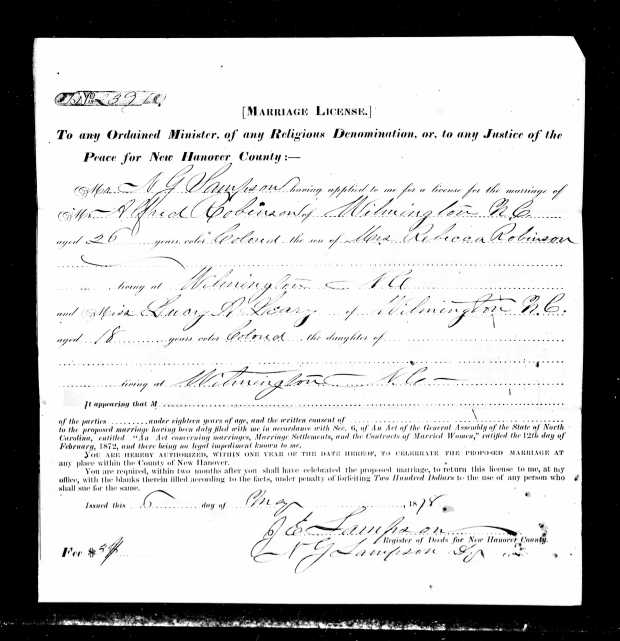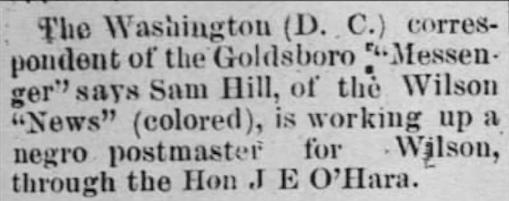Who was Alfred Robinson?
In the 1870 census of Wilmington, New Hanover County, North Carolina: Becky Robinson, 44, huckster; her children Athalia, 24, Polly, 21, and George W., 22; and Sophie Newhoff, 14. Athalia and Polly were dressmakers; George, a shoemaker; and Sophie, a seamstress. Becky reported owning $900 in real estate. She was described as black, and her children as mulatto.
In the 1870 census of Washington, D.C., Alfred Robinson, 19, student, is listed in “Dormitory Howard University.”

Catalogue of Howard University for the Years 1869-1870.
After completing his studies, Alfred returned to Wilmington. In 1878, he married Lucy A. Leary, who had been educated at Hampton Normal & Agricultural Institute. (Lucy was a native of Fayetteville and the daughter of Lewis Sheridan Leary, Harper’s Ferry revolutionary.)



(Notably, the couple’s marriage license listed no parents for Lucy and only Alfred’s mother. His brother George W. Robinson was the official witness.)
The couple initially boarded with Alfred’s sister Athalia’s family. In the 1880 census of Wilmington, New Hanover County, North Carolina: Benjamin F. Scott, 37, wife Athalia M., 34, and children Warren F., 9, Armon W., 7, and Benj. F., Jr., 4, and Thos. A., 2; Alfred Robinson, 27, barber, brother-in-law, and Lucy Robinson, 25, sister-in-law; John Howard, 21, boarder, a porter; James S. Robinson, 1, nephew; and Eliza Carrel, 13, servant.
They’re also found in the 1880 census of Monroe, Union County, North Carolina: Alfred Robinson, 29, barber, wife Lucy, 24, and son James S.A., 1, plus boarder Samuel Pride, 23, barber.
A second child, Mariah, was born in 1880.
By 1884, the Robinsons had relocated to Wilson, where Alfred opened a barbershop on Tarboro Street catering to white clientele.

Wilson Advance, 17 October 1884.
He quickly joined the leadership of the town’s African-American community and was elected president of the Wilson County Industrial Association. Samuel H. Vick, with whom Alfred would become a friendly rival for federal patronage positions, was elected secretary.

Wilson Advance, 3 November 1887.

Weekly State Chronicle (Raleigh), 29 December 1887.

Wilson Advance, 28 March 1889.
Alfred was the first to land a postal job under the patronage of Congressman Henry Plummer Cheatham.

Wilson Advance, 11 April 1889.
The job required frequent travel along his postal rail route, and Alfred sold his barbershop in Wilson.

Wilson Advance, 2 May 1889.

Wilson Advance, 8 August 1889.
The Robinson family apparently kept its home in Wilson at least part-time, though, as Lucy Leary Robinson died there on 30 April 1896.

Wilmington Messenger, 1 May 1896.

Raleigh Gazette, 17 July 1897.
Less than two years after his wife passed, Alfred Robinson lost his mother. She died in Raleigh while visiting Alfred’s sister, Mary Robinson King. The ever-flattering Gazette mentioned her “clever” son Alfred’s postal route between Norfolk and Wilmington.

Raleigh Gazette, 12 February 1898.
Though he is elusive in census records, Alfred Robinson seems to have made a home base in Norfolk by the mid-1890s. In the 1894 Norfolk city directory, he is listed as a clerk living at 28 Lee Av. In the 1904 Norfolk city directory, he is listed as a “Carrier P O” living at 393 Bank. In the 1910 Norfolk city directory, he is a “clerk R M S” [railroad mail service] living at 446 Bute.
James S.A. Robinson married Emma Mossom in Phoebus (now Hampton), Virginia, on 22 December 1903.
In the 1920 census of Norfolk, Virginia: Alfred Robinson, 67, divorced, United States post office mail clerk; James A. Byers, 39, physician; and Maria Byers, 36. The Byerses were renting from Robinson. [From whom was he divorced?]
Within a few months, Maria Robinson Byers was dead of a stroke. Per her death certificate, she died 25 July 1920 at her home at 314 East Bute, Norfolk. She had been born in North Carolina on 2 July 1880 to Alfred Robinson and Lucy Leary, and her body was returned to Wilmington for burial.
Before the year was out, Alfred retired from government service, having served the postal service for 31 years.

Twin City Daily Sentinel (Winston-Salem NC), 26 November 1920.
Alfred Robinson made out a will on 16 July 1926. Reflecting, perhaps, his peripatetic lifestyle, his city of residence is omitted from the document. Golden Robinson, son of his brother George, was the principal legatee with a $2000 bequest, but he also set aside $500 to bury his “mentally afflicted” son James S.A. Robinson; $1000 to be divided among the children of his deceased nephew Benjamin Scott; and $800 to be divided among nieces Parthenia Blakeley, Annie Sadgwar, Rebecca Robinson, and Mrs. Vincent Waters. After bequests to pay for a headstone and the upkeep of his grave, Alfred earmarked the remainder of his estate to be divided among the children of nephews Warren Scott, Thomas A. Scott and Benjamin Scott.

In the 1928 and 1930 city directories of Wilson, Alfred Robinson is listed living at 622 East Green Street. (In other words, he lived in Samuel H. Vick’s household.)
Alfred’s son James S.A. Robinson died 22 July 1930. That year Alfred was involved in an imbroglio with Dr. Lovelace B. Capehart, grand master of the Ancient Free & Accepted Masons, whom he blamed for causing him to lose his position as treasurer of the organization. A Wilson Superior Court judge agreed and awarded Alfred $400 in damages.

Pittsburgh Courier, 22 November 1930.

Pittsburgh Courier, 30 November 1930.
On 6 November 1936, Alfred remarried in Wilson. His wife, Julia Winstead, was a Nash County native. He was about 85 years old, and nearly 40 years his wife’s senior.

On 29 November 1938, Alfred Robinson executed a new will devising an entire estate to his nephew Robert H. Scott, with whom he was living. His property consisted of two lots in Norfolk; a house and lot at 207 North Tenth Street, Wilmington; and two lots in Raleigh. He specifically made no provision for his wife Julia, asserting that he had already made her a property settlement. Nor did he mention his many other nieces and nephews.
Alfred Robinson died 26 June 1939 in Wilmington.

On 27 July 1939, Alfred’s nephew Golden Robinson, son of his brother George, filed his 1926 will in Wilson County Superior Court, asserting that he had found the document “in a small satchel in [Alfred’s] home.” On November 1939, his other nephew, Robert H. Scott the 1938 will in New Hanover Superior Court.
Which prevailed?






























